The Life of Saint Bernardine of Siena
No one was excused from his preaching. He called for reform from the common man as well as from people in high places, in one instance, boldly calling to task the Duke of Milan. He brought about change! His message was so powerfully accepted, the people lit bon fires and cast their sins and worldly temptations upon them, as a firm resolve to live better, more holy lives. One of the scourges of the time was usury - the practice of exacting exorbitant interests, often resulting in the inability of the lender to pay, losing his home and all his worldly goods. To respond to this evil, Bernardine founded a society of beneficial loan societies called “Monti di Pieta.”
Although he preached relentlessly on reform, Bernardine spoke with the gentle, compassionate Heart of Jesus and that of his father Francis. Peace was his primary focus, and toward that aim, he journeyed to the far corners of Italy reconciling warring factions like the Guelphs and Ghibellines. The Guelphs were members of a political party that supported the authority of the Pope against the aristocratic party of the Ghibellines. The Ghibellines, in contrast to the Guelphs, supported the German emperors in Italy, who, hell bent on stealing all the Papal lands from the Papacy, challenged the authority of the Pope. Where all modes of diplomacy and compromise failed, Bernardine with his preaching of Peace and Love succeeded, bringing about reconciliation among the two warring factions.
Bernardine carries the symbol of Jesus
As Bernardine traveled, so did the Holy Name of Jesus. Everywhere he went, he persuaded the dignitaries of the different cities to take down the emblems of the warring factions from their buildings - their churches and palaces - and instead place on them the Holy Name of Jesus. And till today, you can see the initials IHS - the Holy Name of Jesus on all the buildings in Siena and Florence, just to mention a few.
This symbol became his vanguard, as he paved the way for devotion to the Holy Name of Jesus. His preaching on the Holy Name of Jesus was so potent and caught on so quickly, he was asked to speak in city after city. When he spoke, he held a plaque with the emblem of the Holy Name of Jesus on it, in front of him; and with the passion of He, Whom it represented, Bernardine moved the hearts of everyone in the audience to desire the emblem. Soon the emblem was clamored for, to place not only on the outside of buildings, churches and etc., but on homes.






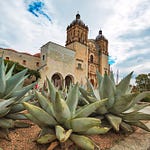


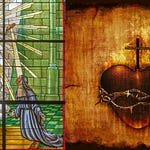
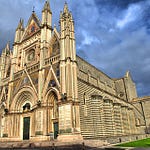
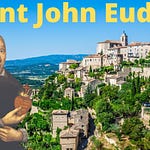
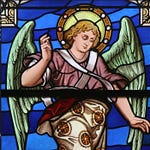

Share this post